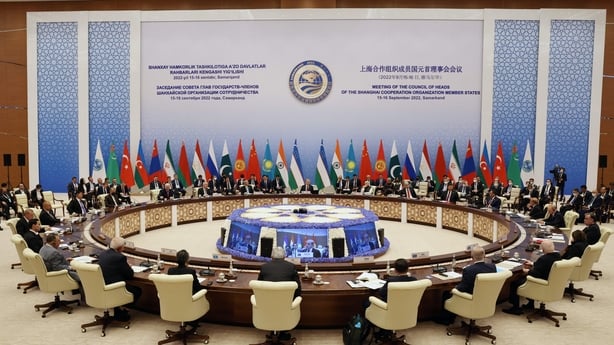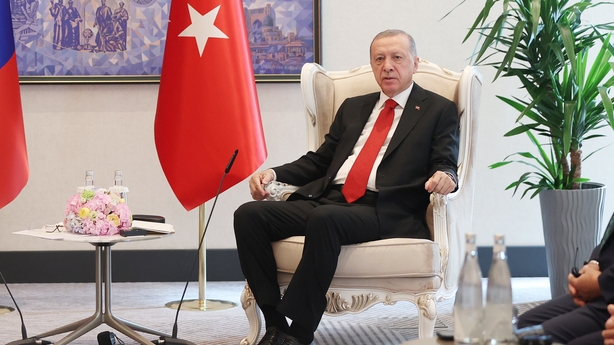Russian President Vladimir Putin has said there were no plans to adjust Russia's military operations in Ukraine despite a counter-offensive, saying Moscow was in no rush to finish the campaign.
"The plan is not subject to adjustment," Mr Putin told reporters during a regional summit in Uzbekistan.
"Our offensive operations in Donbas itself do not stop. They are going at a slow pace... the Russian army is occupying newer and newer territories," Mr Putin said.
"We are not in a hurry... there are no changes."
Mr Putin said Russia was "not fighting with a full army" but only contract soldiers, and said the main goal of the campaign remained "the liberation of the entire territory of Donbas".
He accused Ukrainian forces of attempts to carry out "terrorist acts" and damage Russian civilian infrastructure.
"We are really quite restrained in our response to this, for the time being," Mr Putin said.
"If the situation continues to develop in this way, the response will be more serious."
Meanwhile, Mr Putin and Chinese leader Xi Jinping looked to rally Asian leaders behind a new "international order" as they met for a summit aimed at challenging Western influence.
But cracks in summit solidarity quickly appeared, with India's prime minister telling Mr Putin it was "not the time" for the conflict in Ukraine and the forces of two countries - Kyrgyzstan and Tajikistan - engaged in fierce border clashes while their leaders were in attendance.
The meeting of the Shanghai Cooperation Organisation (SCO) in ex-Soviet Uzbekistan brought Mr Putin and Mr Xi together with the leaders of SCO members India, Pakistan, and four Central Asian nations, as well as the presidents of Iran and Turkey.
Mr Putin and Mr Xi met yesterday for their first face-to-face talks since Russia sent troops into Ukraine in February, and on the Chinese leader's first trip abroad since the early days of the coronavirus pandemic.
The summit was put forward by the Kremlin as an alternative to "Western-centric organisations", at a time of increasing pressure on Moscow over Ukraine and growing anger in Beijing over US support for Taiwan.
Mr Xi told the gathered leaders it was time to reshape the international system and "abandon zero-sum games and bloc politics".
They should "work together to promote the development of the international order in a more just and rational direction," Mr Xi told a joint session.
Mr Putin hailed the increasing influence of countries outside the West, slamming what he called "instruments of protectionism, illegal sanctions and economic selfishness".
"The growing role of new centres of power who cooperate with each other... is becoming more and more clear," Mr Putin said.
Putin admits 'concerns'
The summit has been Mr Putin's first major international outing since Moscow sent troops into Ukraine in February, sparking a conflict that has left thousands dead and seen Russia hit with waves of economic sanctions.
All did not go perfectly for the Russian leader.
In their talks, Indian Prime Minister Narendra Modi told Mr Putin: "Excellency, I know today's time is not a time for war."
Mr Putin told Mr Modi he knew of India's "concerns" about the conflict, echoing language he had used with Mr Xi the day before.
"We will do our best to end this as soon as possible," Mr Putin said, while accusing Kyiv of rejecting negotiations and wanting to achieve its goals "on the battlefield".
The SCO - which also includes Kazakhstan, Kyrgyzstan, Tajikistan and Uzbekistan - was set up in 2001 as a political, economic and security organisation to rival Western institutions.
The group is far from fully united. The leaders of the Kyrgyzstan and Tajikistan were forced to meet at the summit to order their forces to withdraw after deadly clashes along their disputed border raised fears of all-out conflict.
Some 19,000 people had to be evacuated on the Kyrgyz side of the border and sporadic clashes were continuing despite the ceasefire order.

US sounds alarm
For Mr Putin, the summit was a chance to show that he is not fully isolated on the global scene, at a time when his forces in Ukraine are facing major battlefield setbacks.
For Xi, it was an opportunity to shore up his credentials as a global statesman ahead of a pivotal congress of the ruling Communist Party in October, where he is widely expected to secure an unprecedented third term as president.
In Washington, officials sounded alarm about deepening ties between Moscow and Beijing.
US State Department spokesman Ned Price said China and Russia "share a vision for the world that is starkly at odds with the vision that's at the centre of the international system, the vision that has been at the centre of the international system for the past eight decades."
He also took note of Mr Putin's mention of Chinese "concerns" about Ukraine in his talks with Mr Xi, suggesting the "striking" admission showed Moscow did not have Beijing's full support for its military campaign.

Erdogan urges end to war in Ukraine 'as soon as possible'
Mr Putin and Mr Xi both also met with Turkish President Recep Tayyip Erdogan, who told the assembled leaders that efforts were being made "to finalise the conflict in Ukraine through diplomacy as soon as possible".
Mr Putin told Mr Erdogan, who has been a key broker in limited deals between Russia and Ukraine, that Moscow was keen to build closer ties with Turkey and was ready to "significantly increase" all exports to the country.
Mr Erdogan echoed Mr Putin's concern that grain shipped out of Ukraine under a UN and Turkish-brokered agreement was not reaching enough developing countries.
"We are making sincere efforts to deliver the grain to those who need it most, especially our brothers and sisters in Africa," Mr Erdogan said.
Mr Erdogan was due to hold a private meeting with Mr Putin on the sidelines of the Samarkand summit later today.
NATO member Turkey has been supplying weapons to Ukraine while trying to boost trade with Russia during the war.
Mr Erdogan argues that this "balanced" position is required because of Turkey's heavy dependence on Russian energy supplies.
Earlier, Mr Putin told the summit that the SCO should consider staging its own major sporting competition.
He said: "There are good opportunities to intensify sports cooperation with the prospect of holding major sporting events under the auspices of the SCO.
"To do this, we could think about creating an association of sports organisations under our association."
A Russian doping scandal, involving revelations of a state-backed system across many sports, following the 2014 Winter Games in Sochi, Russia, has meant that Russian athletes' participation at subsequent Olympics has been severely restricted.
Those that have competed have only been allowed to do so under a neutral flag.
China, however, has hosted both a Summer and a Winter Olympics since 2008, although both were to some extent overshadowed by war or preparation for war between Russia and former Soviet republics: Georgia in 2008 and Ukraine in 2022.
Belarus President Alexander Lukashenko, a close ally of Mr Putin whose country is an observer at the SCO, told the summit: "We suggest the possibility of holding a complex of sporting competitions within the framework of the SCO: summer events in 2024, winter in 2026."
These dates broadly coincide with those of the Paris 2024 Summer Olympics and the 2026 Milano-Cortina Winter Olympics - both being held in western Europe.
The SCO is a security bloc established in 2001. It comprises China, Russia, India, Pakistan and four post-Soviet Central Asian states, and is in the process of admitting Iran, another state at odds with the West.

